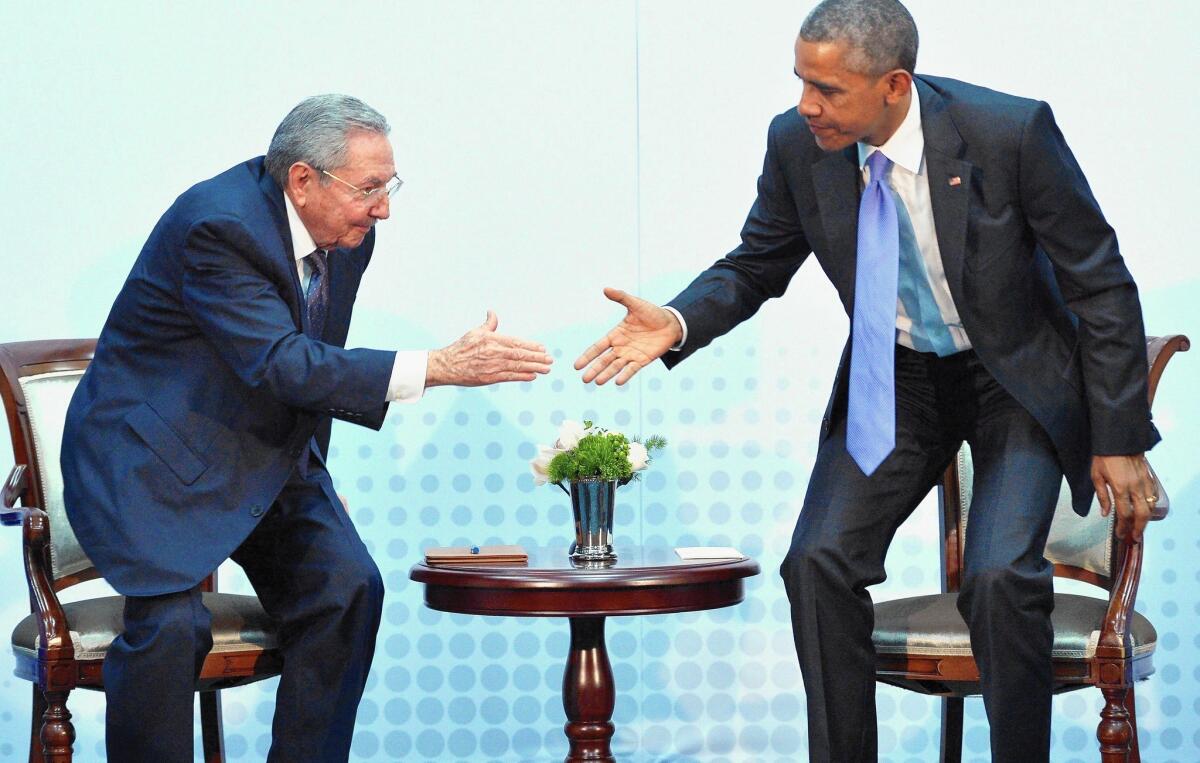President Obama considering visit to Cuba to shore up relations – and his foreign policy legacy

- Share via
Reporting from HONOLULU — President Obama may go to Cuba this year if its government bolsters its human rights record and opens its doors more fully to American business in the coming weeks, a senior advisor to the president said Saturday.
Obama would probably make such a decision in the next couple of months, as his national security team evaluates the tentative warming of relations since the opening of a U.S. embassy in Havana last year.
“The key test,” said deputy national security advisor Ben Rhodes, is “whether the president’s going to Cuba would help advance those priorities,” and in particular, whether a visit would “improve the lives of the Cuban people.”
NEWSLETTER: Get the day’s top headlines from Times Editor Davan Maharaj >>
The controversial possibility arose in a preview of Obama’s foreign policy plans for his final year in office, as aides prepare for the president’s return to Washington after two weeks of vacation with his family in his childhood home state of Hawaii.
By far, the overarching foreign policy challenge of the new year will be the fight against the terrorist organization Islamic State and its efforts to inspire attacks against Western targets.
The Obama administration will be looking to disrupt the terrorist group’s plans, ease the Syrian civil war and push the group out of its safe havens in the region.
Toward that end, aides say, Obama plans to seek a new authorization for the use of military force. The fight against terrorism will also be a focus of conversations with NATO leaders at an upcoming summit in Poland.
But while Rhodes ranked the campaign against Islamic State first in every mention of Obama’s foreign policy priorities, he also made clear that the president planned a full-court press on several projects — all of them crucial to his foreign policy legacy.
In dealings with Iran, Obama plans to spend the next year making sure the Islamic Republic is not making any moves toward developing a nuclear weapon in violation of its agreement with the international community, while also enforcing sanctions still in place. Though some critics are calling for new sanctions, Rhodes said the U.S. government had work to do before new sanctions could be announced.
Obama plans to travel to China and Laos and host Southeast Asian leaders at a summit in California as part of his effort to turn American attention toward Asia. He will also press world leaders to take more steps to fight climate change during a summit in China in the fall.
The normalization of relations with Cuba is of symbolic significance to the Obama administration. It represents not only a historic opportunity to end a lingering remnant of the Cold War but also the chance to push for an affirmative change rather than simply respond to crises in the Middle East.
The initiative has its critics. Many believe that Cuban President Raul Castro will not significantly expand the freedoms of his people and that Obama will go down in history for doing business with a despotic regime.
Rhodes, a lead negotiator in the talks between Washington and Havana, said Saturday that he believed the Castro government had its own reasons to open the way for commerce and to free the flow of information via Internet and cellular communications.
Join the conversation on Facebook >>
“I think they have made a decision that they want this to happen,” said Rhodes, adding that there are changes afoot in Cuba and that the government sees “some degree of change” as “consistent with their revolution.”
Obama’s hope is to make enough progress in U.S.-Cuban relations — with more travel to and corporate investment in the island nation — that a Republican successor could not undo his work.
Obama will go to Cuba, Rhodes said, when and if his team determines a visit would advance that cause.
Twitter: @cparsons
ALSO
Obama asks Americans to help stop ‘epidemic of gun violence’
Donald Trump clip is featured in recruitment video released by Al Qaeda affiliate
Taliban target was a pricey French restaurant, but their victims were Afghans
More to Read
Sign up for Essential California
The most important California stories and recommendations in your inbox every morning.
You may occasionally receive promotional content from the Los Angeles Times.











